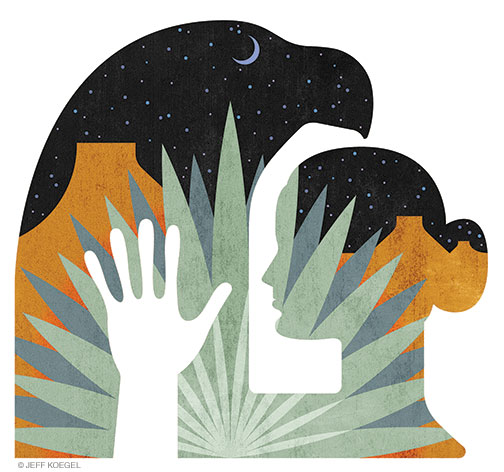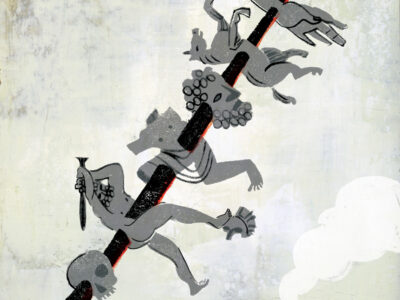
When Paul Christensen Gr’73 arrived at Texas A&M in the late summer of 1974, the central Texas university was transforming itself from a good-sized cow college into a major research institution. The transition was a little dusty at times, both for the school and for Christensen, whose doctorate was in modern American poetry and who had spent his life in more northerly landscapes.
“The old ways lingered, including signs warning students not to bring tobacco products—snuff and spit cans—into the classrooms,” he recalls. “I had to figure out how to teach American poetry to kids who thought only girls read such frivolous literature.”
If Christensen’s students came from truck farms and tiny ranches and the swelling suburbs of Houston and Dallas, they also had a “hidden hunger for a bigger world, new ideas, ways of seeing different from how they had lived.” So did their professor, who was now teaching in classrooms where even Shakespeare “was different from the one taught in New York or California or Oxford”—his characters no doubt speaking with a “subtle drawl,” their swords “flashing like six guns on Main Street.” Regionalism meant “everything was refracted, like a stick in water, to the pull of settler history, hardscrabble farm life, and an Old Testament God.”
Christensen, a 1990 NEA poetry fellow whose 18 books include eight collections of poetry as well as studies of Charles Olson and Clayton Eshleman, has also written numerous essays and short stories in national journals. Among his nonfiction works is West of the American Dream: An Encounter with Texas (Texas A&M University Press, 2001).
“Over the years, I was drawn to the imagination of the Southwest, to its folklore, myths, and borrowings from Mexican and South American literature, especially the hint of magic realism in fiction and the dreamy landscapes in the poetry of Vassar Miller and William Blarney,” he says. “The basis of much artistic awareness rested upon the recent past of Plains Indian life, with its wanderlust borne of the infinite grasslands and roaming bison herds. The poems I write merge my innate skepticism to a sense of wonder I learned through the 37 years I lived in Texas.”
Three years ago, Christensen retired from Texas A&M and headed north with his wife, Cathy. Nowadays they spend their winters in Vermont and their summers in southern France [“Elsewhere,” Mar|Apr 2009]. But as the poem below from The Jack of Diamonds Is a Hard Card to Play (Lamar University Press, 2015) makes clear, he hasn’t lost touch with that sun-baked Texas soil. –S.H.
A West Texas Marriage
A woman who lived out of town
married an eagle after her husband died.
She owned the ranch, and raised
some cows for beef. The river was dry
and she pumped a well to keep the beasts alive.
It never rained on her roof; the garden
died the death of a tortured prisoner.
The road was ruts and seldom raised
its dust, unless the mailman made his run.
The eagle was cold, and stared at her
in bed, and barely touched her shoulder
when they joined bodies to make love.
He was unsentimental as a philosopher,
a creature whose thinking flew him
higher than the moon at times,
and made him a guest of the tops of mountains.
She cooked the supper, tended to the wash,
while he came home with a rattlesnake
in his talons, or the carcass of a lamb.
They seldom spoke; she loved him in her way,
and he loved back, without affection.
He was not of her kind, he said,
and she replied he was. She had her visions, too,
she said, and pulled him to her.
The world went on without them,
and they lived in wordless peace.
He left for days at a time, and flew
to places she did not know existed.
When he returned, he took his bath
in the yard, and lay back exhausted
from his journey. Love in the desert
is never easy; it lives on torment
and disappointment, a daily dose
of venom from a snake, and a yucca
blossom when you least expect it.
–Paul Christensen




